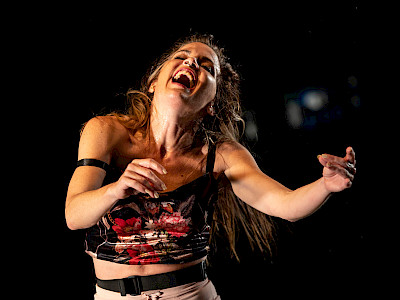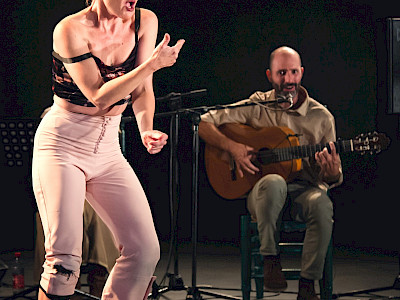24 — 26.05.2025
Los Inescalables Alpes, buscando a Currito ('The unscalable Alps, looking for Currito') is propelled by the burning desire to see someone again. The title and the dance encapsulate an endless effort: to climb the unscalable. Andalusian choreographer María del Mar Suárez, aka La Chachi, has created a hybrid and deeply personal form of flamenco. This style respects yet deconstructs tradition, incorporating elements of krump, all filtered through a punk sensibility.
The live sound from two musicians and a singer first takes centre stage and commands attention. Then, a faint light reveals the figure of La Chachi: her body firmly grounded, flamenco emerging in bursts, like spasms of the limbs. Movements twist and break, disciplines turn upside down. Are we witnessing a concert or a dance performance? The music builds, La Chachi advances toward us as if climbing the Alps, and we watch her as from the top of a mountain. The music loops and thickens with each cycle, like an avalanche that swallows everything in its path, carrying us along and refusing to let go of the search.
Los Inescalables Alpes is visceral and hypnotic, a singular experience that defies genres and establishes La Chachi as one of the most compelling voices of her generation.
The first thing my friend Chachi said to me, when I asked her about Los inescalables Alpes, buscando a Currito (‘The unscalable Alps, looking for Currito’) was: “Currito is a precipice”. To understand this work, which is a path, you have to say that María del Mar is in herself a path. Let’s say that it is a path going towards a precipice, which never ends, and in this never-ending she is defined. She has produced a stage work that well reflects her idiosyncrasy. In “Currito” (the affectionate way in which she refers to her piece), we are attending a pilgrimage. In Andalusian culture, the idea of pilgrimage has always been very closely linked to the culture of celebration and festivity, occasions that very often go hand in hand in southern Spain. But these paths are not separated from martyrdom, suffering and the precipice, to which La Chachi refers as forms of spirituality, transcending the flesh. The dirt of the earth, soiling the feet, and the slight body, after passing through the bodily earthquake of the journey, form part of the same thing: the journey to disappearance and rebirth once more. On a simple stage, where María del Mar is accompanied by her flamenco musicians, guitar and percussion, and her vocalist and loyal squire Lola Dolores, she offers us a fierce, bestial, violent corporality, gripped in a raging volley of flamenco stamping, but in which we never lose sight of the girl herself. And this is one of the keys to the mystery of the work, that the torn body reveals the girl asking for the Virgin’s love. She does not pray for love, she demands it. All this comes very close to me, we have been friends for many years, we love each other, follow and accompany each other. Taking advantage of us being together in a bar in Madrid, I took my phone to record our conversation. She was talking to me of what it meant to her to break with her accustomed idea of choreography; from the abyss of improvisation, from the inspiration of the broken body of krumping, she told me about the pilgrimage she lives through in each show, where she puts herself in danger, about the marks the piece left on her body, the wounds of martyrdom, and in the end we came to her relationship with love, and the name of “Currito”, which is her father’s name, of how the problematic search for filial love appeared in the course of the work at a given moment. In her descent into hell, searching for the love of the Man, she met the shadow of a violent, patriarchal love in the father figure. And here, she said to me: “I had to pass through my father’s violence in order to arrive at the work”. And I certainly gave a little swipe on the table when she said that to me, or else I drank some beer. On the stage, her body is broken, but at the start she breathes with the steadiness of the bullfighter, coldly controlling her horses from hell, but filling the air with a strange prophecy that proclaims the catastrophe to come. And Chachi’s body makes itself available to this violence, and in its pilgrimage, all the ghosts of love pass it by, that of Currito-papa and those of all her loves, if they aren’t the same thing. And as spectators, we take the path with her, and we see the Virgin, and we too end the journey with our body full of wounds, but much closer to true love. She told me: “There will be no other piece like Currito in my career, I’m in my forties, and I have to look after my health”. And I stopped recording. Let’s applaud.
Rocío, Señora, Pastora que alumbra el camino,
la luz de mi Aurora,
Lucero que ilumina el tiempo de todas mis horas,
Almonte será siempre el reino donde te coronan.
- Alberto Cortés, April 2025.
- Translated by Joanna Waller.
Alberto Cortés is director, writer and interpreter.
Presentation: Kunstenfestivaldesarts, La Balsamine
Idea, director and performer: María del Mar Suárez, La Chachi | Singer: Lola Dolores | Guitar: Francisco Martín | Percussion: Isaac García | Lighting designer: Azael Ferrer | Sound: Pablo Contreras | Writer: Cristian Alcaraz | Dramaturgy assistant: Alberto Cortés | Costume designer: Nantú | Video designer: 99páginas/Tandem759 | Manager and international distribution: Luisa Hedo
Performances in Brussels with the support of the Spanish Embassy in Belgium



